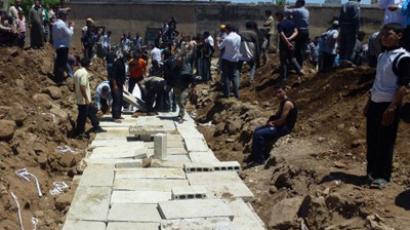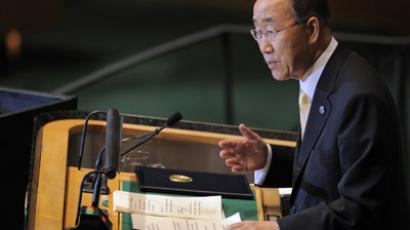UN mission ‘can’t say who to blame’ in Hama massacre
After dozens were reported slaughtered in the Syrian village of al-Qubair, UN observers have been seeking to establish the truth on the events. Yet as the government and opposition accuse each other, the team admits it can’t say who was to blame.
The United Nations monitors reached al-Qubair village in central Hama province on Friday and said there was evidence that a "horrific crime" had taken place there. Their mission is to investigate who was behind Wednesday’s massacre in which up to 80 men, women and children were reportedly killed.“We found the village empty of its local inhabitants, bmp [tank] tracks on the road, a house damaged from shelling, with a wide range of caliber types and grenades,” said spokeswoman for the UN Supervision in Syria Sausan Ghosheh. She added that the mission also “found burned homes, and at least one burnt with bodies inside – there was a heavy stench of burned flesh.”The observers said they couldn’t get to the site before as they were “obstructed in earlier attempts”: the group reported that they were held up at Syrian Army checkpoints, and in some cases turned back. In addition, they were shot at with small arms while on their way to al-Qubair. When they managed to reach the place, they couldn’t find anyone who had witnessed the bloody events.“Residents from neighboring villages came to speak to us, but none of them were witness to the killings on Wednesday,” Ms. Ghosheh said. The spokeswoman had to admit that the mission can’t confirm the number of those killed, or who was responsible for the massacre. “The circumstances surrounding this incident are not yet clear and we have not yet been able to verify the numbers.”Casualty estimates, as well as versions of what happened, vary. Syrian opposition activists say between 55 and 78 people, including women and children, were shot, hacked and burned to death after the village was shelled by government tanks. They claim pro-government militiamen known as "shabiha" entered the village after the shelling and committed the killings.State media strongly deny that the government is responsible and say nine people were killed. On Friday, Syrian Television, the official broadcaster of Syria, released footage of children allegedly slaughtered in Hama and said an armed terrorist group committed “the appalling crime" in al-Qubair, killing nine women and children. A government statement on the state-run news agency SANA said that after the events, residents had appealed to Hama authorities to intervene and protect them. Following this, the report says, authorities headed to the village and stormed a hideout. The violence in Hama comes on the heels of May’s horrific massacre in Houla, a cluster of villages in the central Homs province, where over 100 residents including many children and women were killed by shelling, many of them shot or stabbed to death in their homes. After that massacre, opposition and government similarly blamed each other. Damascus claims the opposition committed the atrocities to provoke international intervention that would oust president Bashar al-Assad. Violence broke out in the country after Assad’s government cracked down on peaceful protests in March 2011.The UN estimates 10,000 people have been killed on both sides during the 15 months of unrest, while opposition gives a figure of 15, 000.On Thursday the UN chief Ban Ki-moon condemned the massacres in Hama and Houla, in his strongest ever dressing-down of official Syria. The Assad government has lost its legitimacy, Ban said addressing a special session of the UN General Assembly.Security Council resolutions against the Assad government were twice blocked by Russia and China, who say they were one-sided, and should blame not only the Assad government but opposition as well.













